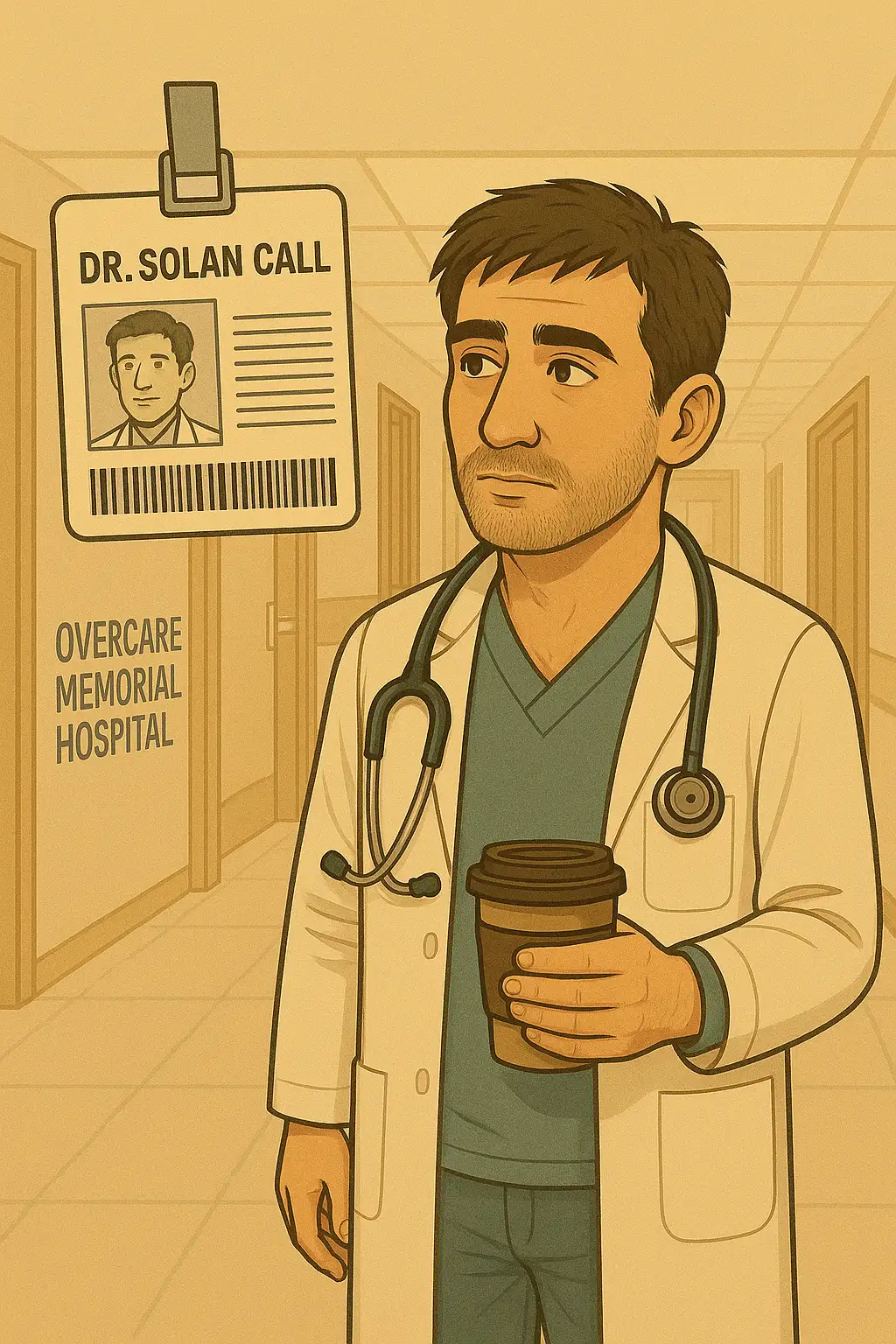From the Soul on Call series
Note: These reflections are fictional and intended for educational and reflective purposes only. They are not medical advice, are not based on any specific individual, and do not represent the views of any employer or institution.
Monday came, as it always did, and Dr. Solan Call stood just inside the glass doors of Overcare Memorial Hospital, breathing in the faint scent of disinfectant and burnt coffee.
He squinted up at the flickering fluorescent light above the entry badge scanner. The hum of a rolling vitals cart passed behind him. Somewhere down the hallway, a printer jammed with enthusiasm.
He winced—not from pain exactly, but from a familiar weight settling into his chest.
Not dread. Not despair. Just… depletion.
The week ahead was routine: consults on the medical ward, rounds with the residents, two family meetings, one departmental gathering he’d already renamed The Meeting That Could’ve Been an Email.
He was not in crisis. He was in rhythm.
And that, oddly, was the problem.
He wasn’t drinking too much. He wasn’t missing work. He hadn’t googled how to disappear into a forest and still pay your mortgage.
(Not recently, anyway.)
By most accounts, he was doing fine.
His inbox was under control. His patients were seen. His discharge summaries were timely. His notes—concise, legible, occasionally poetic—were considered among the best in the department. He was functional. Helpful. A team player.
And yet there was a quiet kind of tired in him that sleep didn’t fix.
It wasn’t depression, exactly. He’d screened himself.
No anhedonia. No early morning wakening. No suicidal ideation.
His appetite was fine. He laughed at memes.
But beneath the smooth mechanics of daily life, something in him felt slightly… misaligned.
Like a joint bearing weight the wrong way—quiet, but persistent.
He noticed it most on Mondays. The calendar looked full, but not unfamiliar. Everything accounted for. Nothing particularly wrong.
And yet, there was a dull resistance inside him.
Like walking into wind.
Like a voice saying, very softly: “Again?”
He didn’t feel burned out.
He felt like he was disappearing into the role.
No one tells you that burnout doesn’t always look like collapse.
Sometimes, it looks like complete notes, fast follow-ups, and perfect punctuality—while something essential inside you quietly powers down.
It took him a while to notice. Because on the surface, he was doing everything right.
He was showing up, being useful, staying late. He wasn’t resentful—not really. He cared. He was good at his job.
But his job was starting to take up more space than he did.
He wasn’t sure when he stopped listening to music. Or reading. Or calling friends without scheduling it two weeks out.
He hadn’t meant to stop.
It had been a slow slide into default settings.
On the way to rounds, he passed the staff bulletin board.
A new poster had appeared—another Wellness Reminder featuring micro-resets, gratitude hacks, and a mandatory QR code.
It was printed in Comic Sans.
He snorted. Nothing said emotional safety like Comic Sans.
Across the hallway, Dr. Frankie Whirl leaned against the stairwell railing, untangling her stethoscope from a pile of snack wrappers and progress notes. She caught his eye, gave him a crooked grin, and disappeared upstairs.
He’d notice her more later.
For now, the noticing had to begin with himself.
He realized how far he’d drifted only after taking a real break.
A full one.
He traveled. Walked unfamiliar streets. Forgot his EMR password.
Sat by windows and watched things bloom.
Wrote a few bad poems. Remembered that he had once wanted to write a novel. Or a play. Or anything at all.
He began to sense a version of himself that had gone quiet:
Curious. Creative. Slightly ridiculous.
Human.
He didn’t quit medicine. He didn’t start a blog or move to Costa Rica.
(That idea belonged to someone else—probably Dr. Zen E. Flow, the attending who did mindfulness rounds in the staff kitchen.)
But Solan did begin a quieter recalibration.
He started asking different questions:
– Who am I when I’m not being useful?
– What have I set down that once made me feel alive?
– What does wholeness look like—not just competence?
He began to notice the invisible contract he’d signed:
That to be a good doctor, he had to be available. Selfless. Tireless.
That rest had to be earned.
That the work came first.
And he realized the system didn’t write that contract alone.
He had signed it, too.
And maybe—just maybe—he could revise it.
Burnout, he learned, wasn’t always about collapse.
Sometimes, it was about absence.
The absence of joy.
The absence of self.
The slow substitution of personhood with profession.
And the path back wasn’t dramatic.
It started with noticing:
– What softens me?
– What lights me up?
– What have I neglected that I actually need?
Joy, it turned out, was quieter than he remembered.
But it was still there.
He just had to make enough space to hear it.
🌱 Ready to explore further?
If something stirred in you as you read, you might find this week's Soul Kit helpful:
The Self Beneath the Badge
It's a quiet invitation—not a solution. Just a place to pause, reflect, and reconnect with the part of you that exists beyond the role.
Want to keep going?
One email a week with the latest story and Soul Kit.
